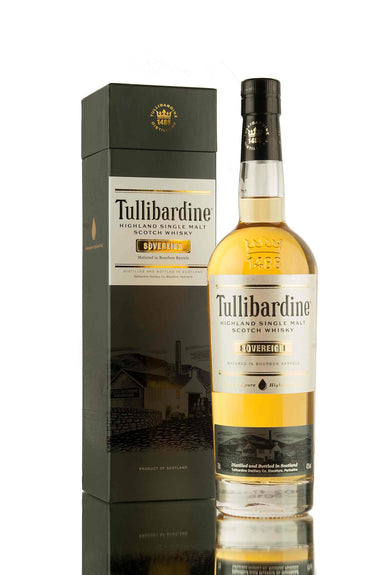
Tullibardine Sovereign
Sovereign, the signature single malt from Tullibardine distillery, matured in first fill ex-bourbon barrels. Floral, sweet barley and vanilla.

Tullibardine was established in 1949 after the 2nd World War came to an end and distilleries across Scotland were being revived or established with the limitations on grain and distilling...
Tullibardine was established in 1949 after the 2nd World War came to an end and distilleries across Scotland were being revived or established with the limitations on grain and distilling being removed.
You may have noticed that some recent releases from Tullibardine quote the year 1488, which is a little optimistic in distillery terms, but actually refers to a brewery that existed on the site around this time. The Tullibardine that we know was founded by architect William Delme-Evans who had bought the former brewery site in 1947. He set about converting the existing buildings into their new purpose of distilling whisky. It’s fair to say that Tullibardine isn’t one of the most attractive distilleries in Scotland and is easily overlooked as you drive past it. William did not stick around for long, selling the distillery in 1953 to whisky brokers Brodie Hepburn for a price that both sides seemed happy with. He went onto revive the distillery on the Isle of Jura, but for Tullibardine new owners arrived in 1971 in the presence of Invergordon Distillers.
This particular firm have established a reputation for producing vast quantities of whisky without too much regard for quality and they doubled the number of stills to 4 in 1973. Whether it is the cut of the spirit or the standard of casks utilised, Tullibardine was seen as a site that produced stock for blending and little else during this period. Eventually, Whyte & Mackay purchased the parent company in 1993 and closed Tullibardine the following year. They had little time for this small Highland distillery that lacked a single malt presence and was fairly unloved by all.
The distillery may have been lost to time except a consortium comprising of 5 businessmen was formed to purchase the site in 2003 at a cost of £1.1 million. It’s the arrival of these new owners that begin to shape the distillery we know today. Production resumed by December of the same year and the team had grand plans including a retail park on the site that would harness passing traffic. For a while the retail arm of the operation worked. The units were full and visitors would often venture down towards the distillery that was shoehorned into a corner of the layout.
Sadly, the owners had to contend with the previous inventory that mainly consisted of maturing whisky that resided in poor casks. Intent on establishing Tullibardine as a single malt and tapping into the growing demand for this type of whisky, various cask finishes were used and the re-racking of barrels also utilised. Whilst this approach expanded the range and brought some of the single spotlight upon Tullibardine, the whisky itself was at best average in quality. Some of the cask finishes tried to mask the quality of the whisky leading to some rather disappointing experiences. Thankfully when their own distilled spirit could be bottled as whisky – arriving as Tullibardine Aged Oak Edition in 2011 – it showed an upturn in fortunes.
However bad luck was still around the corner with property prices falling and the banking recession arriving, Tullibardine required new ownership with deeper pockets. This arrived in the form of the current owners Picard Vins & Spiritueux who purchased the distillery in 2011 with a vision of using the site for its Highland Queen brand. Their vision arrived in 2013 with a revamped core range demonstrating a new-found confidence for Tullibardine consisting of the 225 Sauternes, 228 Burgundy and the 500 sherry finishes. Specific age statements were also released including the launch of an exclusive range falling under the banner of the Custodian Collection. Even the independent bottlers have been releasing various aged examples from Tullibardine to much surprise from enthusiasts who have experienced these releases.
Wholesale changes were made on the site itself in 2014 with the remaining retail units becoming vacated. No longer a retail village, the whole site would now be for the use of Tullibardine and work commenced on converting the existing buildings. With sales and profits on the rise and exports abroad expanding, Tullibardine looks set to capitalise on consumer interest and put behind its problems of the past.
 Sale
Sale
Sovereign, the signature single malt from Tullibardine distillery, matured in first fill ex-bourbon barrels. Floral, sweet barley and vanilla.

